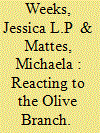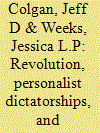| Srl | Item |
| 1 |
ID:
188391


|
|
|
|
|
| Summary/Abstract |
A popular view holds that foreign policy hawks have an advantage at bringing about rapprochement with international adversaries. This idea is rooted in domestic politics: voters respond more favorably to efforts at reconciliation when their own leader has a hawkish rather than a dovish reputation. Yet, domestic reactions are only part of the equation—to succeed, rapprochement must also evoke a favorable response by the adversary. In this research note, we argue that hawks who make conciliatory gestures may face international liabilities that could offset their domestic advantages. Foreign audiences should view doves who make overtures as more sincere and should therefore be more willing to support cooperation with foreign doves than with foreign hawks. We field a pair of survey experiments to examine whether Americans respond differently when foreign hawks versus foreign doves deliver the olive branch. We find that foreign doves fare better at eliciting cooperation because they are deemed more sincere, though the prospect of military vulnerability limits how willing Americans are to respond positively even to a dove who makes a gesture. Thus, while past research has shown that hawks are better positioned domestically to initiate rapprochement, our findings suggest that they have a harder time eliciting a favorable response from the adversary.
|
|
|
|
|
|
|
|
|
|
|
|
|
|
|
|
| 2 |
ID:
139792


|
|
|
|
|
| Summary/Abstract |
A consensus exists that countries that have recently undergone domestic political revolutions are particularly likely to become involved in military conflicts with other states. However, scholars seek to understand when and why revolutions increase the likelihood of international violence. In contrast to existing work focusing on international systemic factors, we argue that revolution fosters conflict in part by affecting states’ domestic political structures. Previous research has shown that revolution tends to bring particularly aggressive leaders to power. We demonstrate that revolutions also frequently result in personalist dictatorships, or regimes that lack powerful institutions to constrain and punish leaders. By empowering and ensconcing leaders with revisionist preferences and high risk tolerance, revolutions that result in personalist dictatorships are significantly more likely to lead to international conflict than revolutions that culminate in other forms of government. Our arguments and evidence help explain not only why revolution so commonly leads to conflict, but also why some revolutions lead to conflict whereas others do not.
|
|
|
|
|
|
|
|
|
|
|
|
|
|
|
|